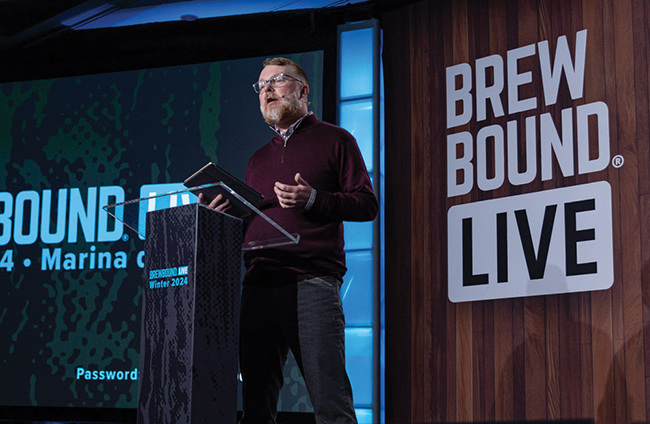Brewbound Live Winter 2024 Review
As craft beer enters a new uncharted era, leaders of established breweries shared how they keep decades-old flagship brands fresh and relevant for new generations of drinkers during the Brewbound Live business conference.
“Something that’s really important, particularly with a decades-old brand, is you don’t want to alienate your fan base that has built and followed you just to chase innovation,” Bell’s Brewery EVP Carrie Yunker said. “You really want to make sure that it makes sense for that family and that is what they expect to be drinking.”
Yunker discussed how Bell’s has evolved two of its biggest beers, flagship Two Hearted IPA and seasonal Oberon, into brand families. For Two Hearted, Bell’s found drinkers appreciated classic styles brewed excellently, but Oberon fans were different.
“That consumer really gave us a lot of permission to play with flavor, to play in a space where things were a little more vibrant and exciting,” Yunker said.
Rogue Ales president Steven Garrett discussed the Newport, Oregon-based craft brewery’s journey to launching an entire family of Dead Guy-branded beers, named for the brewery’s flagship.
“In one word, it was terrifying. Dead Guy Ale has been around for 32 years. We probably get pictures once a week of someone who has tattooed the Dead Guy logo onto their body, so this is a brand that has passion, that people care about. They’ve been drinking it for a long time,” Garrett said. “The idea of ‘Is there going to be backlash? Or is there gonna be an uprising?’ as we do this was definitely top of mind.
“There’s a risk to innovating, but there’s probably a bigger risk to just standing still,” he continued. “Now that we’re doing it, now that it’s starting to work, it’s interesting to see all the people that have worked at Rogue for a lot of years that are like, ‘Oh, we thought about this for a long time, and it’s just hard to pull the trigger.’”
Craft beer ended 2023 with dollar sales roughly flat (-0.9%) at multioutlet grocery and convenience stores but volume -4.4%, according to market research firm Circana. Could craft brewers seek to emulate other beer category segments that found more growth last year, such as non-alcoholic beer, which grew dollar sales +29.3%?
Only if it makes sense to consumers, CANarchy Craft Brewery Collective chief commercial officer Chris Russell said.
“When it comes down to it, you don’t want to overextend or extend too quickly and come across as inauthentic,” he said. “For us, we sometimes overthink it and evaluate it in every different way you possibly can, but I think at the end of the day, if it’s something that the consumer is going to identify with, if they can see a connection between Dale’s Pale Ale, the flagship that’s been around for almost 25 years, and a non-alcoholic beer, then it works.”
CANarchy line-extended Oskar Blues Dale’s Pale Ale in 2023 to include Dale’s Light Lager, a counterweight to the Dale’s Double IPA that rolled out in 2022. All three beers got refreshed branding that highlighted the Dale’s name, rather than Oskar Blues.
“I’ve worked with the Oskar Blues Dale’s brand for about 11 years now. I can still tell somebody that I work for Oskar Blues and they look at me like, ‘Huh, what’s that?’ and then you say Dale’s Pale Ale and they know exactly what you’re talking about. I think the idea of getting out of your own way sometimes is important,” Russell said.
“For us, we wanted to really simplify the overall art and focus in on that iconic oval that the Dale’s is front and center with,” he continued. “It’s not hiding or trying to remove Oskar Blues by any means, but letting the franchise brand stand out more.”
Lawson’s Finest Liquids, the youngest brand represented on the panel, has taken its time when extending its Sunshine brand to new products, CEO Adeline Druart said.
“Our goal is not to mess it up, but really to enhance the brand,” she said. “We’re very intentional about line extension and we’re slow at it because we started with Double Sunshine almost 15 years ago and then Sip of Sunshine is going to be celebrating 10 years.”
The Waitsfield, Vermont-based craft brewery ships its offerings through a cold supply chain. Because of the complexities associated with that, Lawson’s has yet to launch a variety pack, a popular package format in craft beer of late. But they are “determined to figure it out,” Druart said.
“We focus on core values,” she said. “When we make the product, we want it to be the finest, the freshest and always kept cold. It’s a 100% refrigerated supply chain, and it’s short shelf life. It’s 60 days. … We do intend to solve this, because a variety pack not only anchors your consumer into your flagship brand – our Sip of Sunshine – but then introduces the consumer to a product that they may not have found or picked or wanted to try.”


Receive your free magazine!
Join thousands of other food and beverage professionals who utilize BevNET Magazine to stay up-to-date on current trends and news within the food and beverage world.
Receive your free copy of the magazine 6x per year in digital or print and utilize insights on consumer behavior, brand growth, category volume, and trend forecasting.
Subscribe